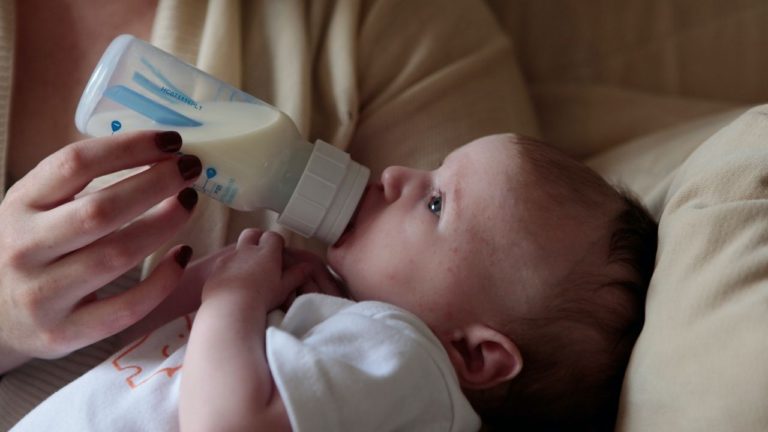Sudden Drop in Milk Supply? 5 Possible Causes (& How to Get It Back!)
This post may contain affiliate links and we may earn commissions when you make a purchase through these links (at no extra cost to you). See our disclosure policy for more details.
10 Tips for Increasing Breast Milk Supply + Other FAQs Answered
Are you worried about a sudden drop in milk supply? Wondering what might have caused it and how you can get it back?
Fear not! If you’re exclusively nursing, it’s possible that your supply is fine. And even if your supply truly has dipped, it doesn’t mean your breastfeeding journey is over yet.
There are various reasons why your baby might be cluster feeding or why you’re not able to pump as much as you used to.
In this post, I’m going to share a few possible causes of low milk supply along with some tips to help increase the amount of milk you’re producing. I’ll cover a few other questions you might have, as well.
It can be nerve-wracking if it seems your baby isn’t getting enough to eat, but first of all… Take a breath. You’ve got this!
Now, let’s get started.

Disclaimer: This information is not meant to replace professional medical advice
Possible Causes of a Sudden Drop in Milk Supply
First of all, whether you suspect or know for sure that your milk supply has decreased, you’ve probably wondered WHY it might have happened.
While it can be hard to pinpoint an exact reason why your supply dropped suddenly, there are a few things to consider.
- You’re not breastfeeding or pumping enough. Because milk production is based on supply and demand, when there’s less demand, your body will eventually start to produce less.
- Your period has returned (or is returning). Hormonal changes can absolutely affect your breastmilk supply, and you might see a temporary decline in production during certain parts of your cycle.
- You’re stressed or sleep deprived. During the “fourth trimester” you’re likely sleep deprived, and probably a little stressed, meaning your cortisol levels are out of whack – again with the hormones! – in turn, potentially affecting your supply.
- You aren’t getting enough food or water. While your body should continue to produce the good stuff for your baby, even if you’re forgetting to eat and drink, extreme dieting and severe dehydration could impact your milk supply.
- Your medications are affecting your supply. While the majority of medications are compatible with breastfeeding, certain herbs and medicines could have an impact on the amount of milk you produce – always do your research and consult with a medical professional before starting anything new.
These are just a few potential causes of a sudden drop in milk supply. If you aren’t producing enough milk and you’re unsure what’s causing it, consult with a professional for an evaluation.
Signs of Low Breastmilk Supply When Exclusively Breastfeeding
Do your breasts suddenly feel softer? Have they stopped leaking, or have you stopped feeling your letdown? Perhaps your baby is fussier or nursing more frequently.
(FYI: These signs DO NOT necessarily mean you’re not producing enough milk!)
If you’re exclusively breastfeeding, or pumping after nursing your baby, then you might be wondering if you are producing enough milk. Often, moms will pump after nursing and wonder why they are suddenly not able to pump as much as they used to.
Frankly, a lot of moms think that they have a low milk supply when they are actually producing the perfect amount for their baby. This is called Perceived Insufficient Milk.
So, then, what are the signs of low breastmilk supply when you’re exclusively breastfeeding?
- Your baby is not having an adequate number of wet and dirty diapers.
- Your baby is not gaining (or is possibly losing) weight.
Have you noticed that diaper output has decreased? Baby isn’t gaining weight? Go ahead and contact your pediatrician!
You can also contact a trained breastfeeding counselor or a certified lactation consultant for additional support.
Sudden Drop in Milk Supply When Exclusively Pumping
When you’re exclusively pumping, a sudden drop in milk supply will be obvious. Unfortunately for EP mamas, it’s not uncommon to experience a low output for a number of reasons:
- You might not be pumping often enough or your sessions might not be long enough.
- Your body might not respond well to a breast pump.
- And, of course, it could be any of the reasons we discussed earlier in this article.
(Don’t worry, we’ll get to some ways you can bring your milk supply back shortly!)
Sudden Drop in Milk Supply When Pregnant
If you’re pregnant, you might notice a dip in supply as early as the first month. And if not immediately, you’ll likely see a noticeable decrease by mid-pregnancy. The drop is due to the rise of progesterone levels.
Personally, I noticed a sudden decrease around 16-18 weeks into my second and third pregnancies.
If you continue nursing throughout the pregnancy, you might notice that your supply begins to increase again toward the end. This is when colostrum production kicks in for the new baby.
When your mature milk starts changing to colostrum, your nursling may or may not dislike the different taste. This is often when they self-wean. Sometimes, though, toddlers are delighted by the sudden increase in milk and will start nursing more frequently again.
Am I Going to Completely Lose My Milk Supply?
No! A sudden drop in milk supply does NOT necessarily mean you’re going to completely lose it or that you have to quit breastfeeding.
Your baby might start nursing more to help build your supply. Otherwise, if they’re over one year old, they might start eating more solids to make up for it.
As you’re likely aware, if under one year old, milk should be their primary source of nutrition. You might need to supplement with formula if they’re not getting enough (at least until your supply increases).
The most important thing is making sure your baby is getting enough to eat (which we’ll address in the next section). And as long as your baby is getting enough breast milk, you shouldn’t have to supplement.
Is My Baby Getting Enough to Eat?
Are you exclusively breastfeeding and concerned that your baby isn’t getting enough milk? It’s understandably worrying!
However, you can relax if:
- You can see and/or hear your baby swallowing milk.
- Your baby appears content after feeding. Their hands should be relaxed and they should be alert after nursing.
- Your baby is peeing and pooping. By Day 4, they should be going through at least six wet diapers and 3-4 dirty diapers.
- Your baby is gaining weight. Please note that a 5-7% weight loss in the first few days is normal! Baby should be back at his or her birth weight within the first two weeks, though.
- Your breasts feel softer after a nursing session.
Still suspect low milk supply? Move on to the next section and we’ll cover some ways you can get your breast milk supply back.
How to Get Your Breast Milk Supply Back
I hear it all the time: “How can I increase my milk supply?” This is coming from worried mamas who understandably want to make sure their baby is getting enough to eat.
Keep in mind that it can take a little time to build your milk supply back up. So relax, supplement IF NEEDED, and try some of these tips.
- Nurse on demand.
- Make sure milk is removed efficiently.
- Offer both sides.
- Try “switch nursing”.
- Power pump.
- Use heat packs and massage.
- Replace pump parts.
- Take a “nursing vacation”.
- Practice self care.
- Use galactagogues.
Need more information on any of these ten tips? Head on over to my article on how to increase your breast milk supply fast, where I cover the details of switch nursing, power pumping, and so on.
Can a Haakaa Increase My Milk Supply?
Because breast milk production is based on supply and demand, yes – using a Haakaa can increase your milk supply. So if you’re using it to withdraw extra milk while nursing the baby, your body is getting the signal to produce more.
If you have a low supply then using a Haakaa could potentially help build it back up, although based on what I’ve seen and heard, some have better luck with it than others. Of course, there is no harm in trying it out if you need to increase your milk supply!
Acupuncture to Increase Milk Supply
Although acupuncture has been used as a therapy to increase milk supply, the results seem to vary and it is hard to prove or disprove its effectiveness. The few studies that have been done don’t meet current evidence-based guidelines, in part because of the “extreme difficulty in double-blinding and placebo-controlling acupuncture studies” (NCBI).
While it hasn’t been scientifically proven to increase milk supply, if it’s something you’re comfortable with, there doesn’t seem to be any harm in trying acupuncture, or even acupressure.
Final Thoughts
If you’re worried about a sudden drop in milk supply, relax! Your breastfeeding journey isn’t necessarily over yet. First, you’ll need to determine why you’re suddenly producing less milk, and then you can determine what comes next.
Good luck! And again… You’ve got this.
Read More:
Breastfeeding Tips for New Moms Who Want to Exclusively Nurse
Best Wearable Breast Pump for Pumping on the Go: Willow vs. Elvie







